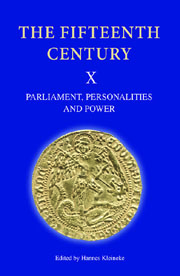Book contents
- Frontmatter
- Contents
- List of Illustrations
- Contributors
- Acknowledgements
- Preface
- Abbreviations
- The People and Parliament in Fifteenth-Century England
- ‘A Beest envenymed thorough … covetize’: an Imposter Pilgrim and the Disputed Descent of the Manor of Dodford, 1306-1481
- Henry Inglose: A Hard Man to Please
- London Merchants and the Borromei Bank in the 1430s: the Role of Local Credit Networks
- ‘Mischieviously Slewen’: John, Lord Scrope, the Dukes of Norfolk and Suffolk, and the Murder of Henry Howard in 1446
- A Fifteenth-Century Medicus Politicus: John Somerset, Physician to Henry VI
- ‘Domine Salvum Fac Regem’: The Origin of ‘God Save the King’ in the Reign of Henry VI
- ‘Monuments of Honour’: Clerks, Histories and Heroes in the London Livery Companies
- The East Anglian Parliamentary Elections of 1461
- Changing Perceptions of the Soldier in Late Medieval England
- Thomas More, the London Charterhouse and Richard III
- Index
- Tabula Gratulatoria
Changing Perceptions of the Soldier in Late Medieval England
Published online by Cambridge University Press: 05 February 2013
- Frontmatter
- Contents
- List of Illustrations
- Contributors
- Acknowledgements
- Preface
- Abbreviations
- The People and Parliament in Fifteenth-Century England
- ‘A Beest envenymed thorough … covetize’: an Imposter Pilgrim and the Disputed Descent of the Manor of Dodford, 1306-1481
- Henry Inglose: A Hard Man to Please
- London Merchants and the Borromei Bank in the 1430s: the Role of Local Credit Networks
- ‘Mischieviously Slewen’: John, Lord Scrope, the Dukes of Norfolk and Suffolk, and the Murder of Henry Howard in 1446
- A Fifteenth-Century Medicus Politicus: John Somerset, Physician to Henry VI
- ‘Domine Salvum Fac Regem’: The Origin of ‘God Save the King’ in the Reign of Henry VI
- ‘Monuments of Honour’: Clerks, Histories and Heroes in the London Livery Companies
- The East Anglian Parliamentary Elections of 1461
- Changing Perceptions of the Soldier in Late Medieval England
- Thomas More, the London Charterhouse and Richard III
- Index
- Tabula Gratulatoria
Summary
In the summer of 1514 a curious case came before the mayor's court in Norwich. It concerned a Lancashire priest, Adelston Attylsey, who had come to Norwich to serve in the household of Sir Philip Calthorpe. Attylsey had got his hands on ‘an Englysshe boke in print’, entitled Thordre and behauyoure of the right honourable Erle of Surrey tresour and Marshal of Englande ayenst the kynge of Scottes and the Inuasions howe the same kynge at the Batayle of Brakston was slayne by the sayd erle. This was an account of Surrey's famous victory at Flodden printed by the king's printer, Richard Pynson, which sought to magnify the Howards' role in the battle. Attylsley, riled by the slanderous accusations levelled against the Cheshire contingents and his hero, Sir Edward Stanley (who, the work alleged, had fled the field), took up his pen and ink, scratched out the word ‘honourable’ and changed the title to read ‘the horrorable Erle of Surrey’. His defacement of the book was soon discovered, however, and he fell into a heated argument with Sir Philip's other household servants, who were ‘of the company of Norf’ and Suff', over who had fought bravely and who had fled. The ensuing disturbance resulted in Attylsey having to explain himself to the mayor of Norwich and his fellow justices of the peace.
As well as providing a fascinating insight into early sixteenth-century tavern life, this case is important because of what it reveals about the way in which war and the military service of local communities were perceived in early Tudor England.
- Type
- Chapter
- Information
- The Fifteenth Century XParliament, Personalities and Power - Papers Presented to Linda S. Clark, pp. 189 - 202Publisher: Boydell & BrewerPrint publication year: 2011



